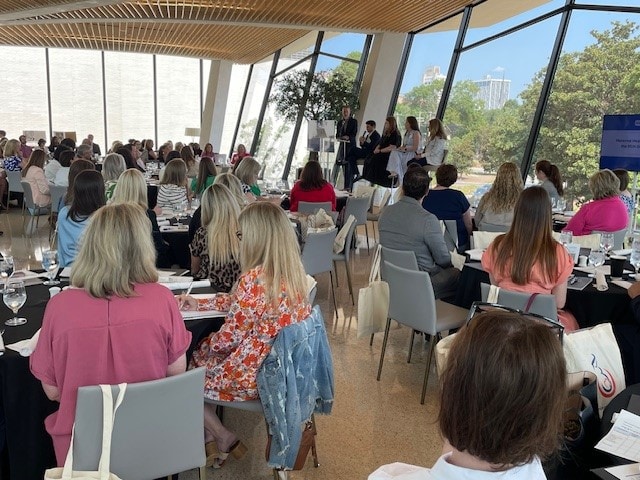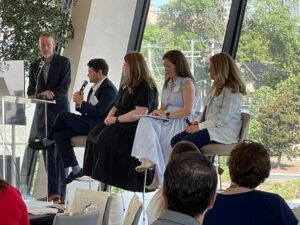View Larger Image

Roundtable participants
Aug. 15, 2025 | Doctors, birthing center administrators, lawmakers and advocacy groups from across the state gathered Aug. 6 in downtown Little Rock for an “honest dialogue” about ongoing efforts to improve maternal health outcomes in Arkansas.
The Arkansas Maternal Health Roundtable, hosted by the Arkansas Center for Women and Infants’ Health at the University of Arkansas for Medical Sciences (UAMS) and the Arkansas Hospital Association (AHA), featured talks by speakers who are approaching the state’s maternal health crisis from different angles and wanted to learn about and empower each other’s efforts, to jointly improve health outcomes.
Nirvana Manning, M.D., professor and chair of the UAMS Department of Obstetrics and Gynecology and director of the center, welcomed more than 100 attendees who gathered in the Cultural Living Room at the Arkansas Museum of Fine Arts.
“Whether you’re joining us from the Delta, the Ozarks or central Arkansas, your presence in this room signals your commitment to healthier mothers, healthier babies and a stronger Arkansas,” she said. “This roundtable was created with one goal in mind: to align, connect and empower the clinical and administrative leaders driving maternal health across our state. It’s a space for honest dialogue, policy understanding, service innovation and shared accountability.”
Among the topics discussed were the center’s initiatives to improve the state’s dismal maternal and infant health statistics, and the Healthy Moms, Healthy Babies Act of 2025, which Gov. Sarah Sanders signed into law in February.
State Rep. Aaron Pilkington, with microphone, describes recent legislative activity on maternal health initiatives during a panel discussion in the cultural living room.
The center’s initiatives, funded by a $5 million congressional appropriation to UAMS in 2024 that was championed by U.S. Sen. John Boozman, focus on education and standardizing discharge procedures for all postpartum moms in Arkansas. They began in February as pilot projects at UAMS and are in the process of expanding to all 33 birthing centers statewide.
The center’s three initiatives are:
Standardized postpartum education for mothers and babies with Mother & Infant Supply Kits, which are given to mothers of newborns as they leave the hospital,
“I Gave Birth” bracelets, which are distributed to postpartum mothers to alert health care providers and others that the wearer has recently given birth and is at risk of complications,
A Proactive Postpartum Call Center in which nurses call postpartum women seven to 10 days after discharge to ensure they are receiving the care they need.
“We hope to scale up our call center with the goal of calling every postpartum patient in Arkansas by the end of the year,” Manning said.
The new state law allocated more than $45 million to establish presumptive Medicaid eligibility for pregnant women, allow reimbursement for doulas and community health workers as well as coverage for remote patient monitoring, and unbundle Medicaid payments so more services can be covered.
Boozman said he and other members of the state’s congressional delegation “are very appreciative that UAMS has stepped up to play in addressing this challenge,” adding, “Dr. Manning has been a tireless champion and trusted voice for women’s health.”
“Sometimes the best tool in our toolbox is simply bringing people together,” he said. “Because our state is so rural, there are important benefits to working together to leverage expertise, experience and networks that bring out real results for patients.”
Noting that UAMS provides quality care throughout the state, Boozman said, “Today represents the next chapter in the pursuit of a healthier outlook for more Natural State moms.”
Manning said the state Maternal Mortality Review Committee, on which she serves, determined that nearly 90% of all Arkansas maternal deaths are preventable, “which is why we created this center.”
“Arkansas is a largely rural state,” she said, “and many of our communities are health care deserts, meaning they lack access to essential medical services, including maternal and prenatal care. For women in these areas, getting the care they need during labor, pregnancy and the postpartum period can be extremely difficult.”
She said social determinants like income, education, transportation and housing “also play a huge role in the maternal health crisis. These factors affect not only access to health care, but also a woman’s ability to stay healthy during and after pregnancy.”
“While people think of maternal mortality as something that happens during labor or delivery, the reality is that more than half of these maternal deaths occur after birth,” Manning said. “It means that women are often falling through the cracks after they leave our hospitals.”
“Women are at risk for a serious range of complications,” Manning said, “many of which can be missed or overlooked as normal if you’re not looking for them. Some of the most common causes of postpartum maternal mortality are hemorrhage, hypertensive disorders like preeclampsia, infections, blood clots, cardiac conditions and mental health crises. Each of these complications is preventable or treatable with the right care, but too often, women are not getting the follow-up they need to catch these issues, or fail to see the signs and seek help.”
She said several symptoms of serious complications “can be very subtle,” and more than 40% of women don’t attend their postpartum doctor visit, “which is crucial for identifying and addressing potential health care issues.”
Some women or their families dismiss maternal warning signs as “just part of the recovery process,” Manning said, while “others struggle trying to find childcare, navigate transportation or simply prioritize their own health while taking care of a newborn baby.”
Pearl McElfish, director of the UAMS Institute for Community Health Innovation, was part of a four-person panel on policy and reimbursement rates. She told the group that a $17 million federal Transforming Maternal Health Model grant the state received in January intentionally overlaps with other policies and initiatives to support the maternal health collaborations.
While the roundtable’s main focus was the critical role of hospitals in resolving Arkansas’ maternal health crisis, other panels focused on maternal health advocacy efforts during the 95th General Assembly, as well as ongoing initiatives to integrate doulas and midwives into clinical care and to deliver tailored resources to postpartum moms through an app.

